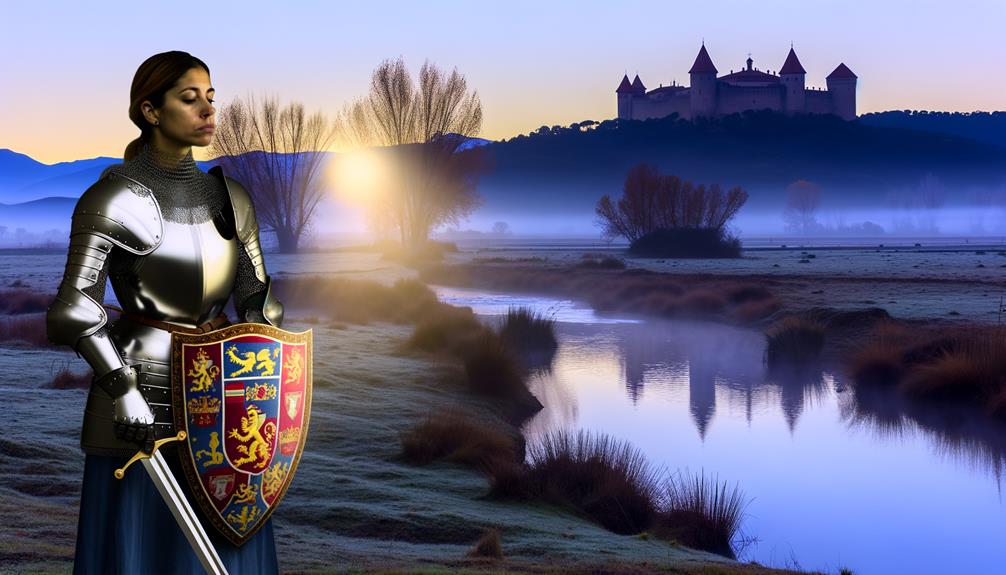Meaning of the Name Alvaro
The name Alvaro, originating from medieval Spain during the Reconquista, denotes valor and guardianship. Its etymological roots can be traced to the Germanic language, meaning 'guardian' or 'elf warrior'.
It enjoys historical prominence among the Spanish aristocracy and has significant cultural resonance in Spanish, Portuguese, and Latin American societies. Alvaro also appears in medieval European literature, emblematic of nobility and valor.
Today, it remains popular in regions such as Spain, Latin America, and Portugal. The name, with variants like Álvar and Alvarinho, reflects a blend of tradition and modernity.
To explore the depth of its cultural significance further, consider the layers of its historical narrative.

Key Takeaways
- The name Alvaro means 'guardian' or 'elf warrior' in its Germanic origins.
- It symbolizes valor and leadership, historically linked to Spanish aristocracy.
- Alvaro has strong cultural significance in Spanish, Portuguese, and Latin American heritages.
- The name is associated with nobility and appears in medieval European literature.
- Popular in Spain, Latin America, Italy, Portugal, and the United States.
Historical Origins
The name Alvaro has its roots in medieval Spain, deriving from a combination of Gothic and Latin linguistic elements. Emerging around the 8th century, it gained prominence during the Reconquista, a period marked by Christian efforts to reclaim Iberian territories from Moorish control.
Prominently borne by nobility and influential figures, the name Alvaro symbolized valor and leadership. Historical documents validate its widespread usage among the Spanish aristocracy, underscoring its cultural significance.
Over centuries, the name traversed beyond Spain's borders, embedding itself in Portuguese and Latin American heritages. This historical diffusion underscores Alvaro's enduring resonance.
Its consistent presence in royal charters and legal records illustrates a name deeply interwoven with Spain's sociopolitical fabric, reflecting its substantial historical legacy.
Etymological Roots
The name Alvaro originates from the Germanic language, where it is believed to have derived from elements meaning ‘guardian’ or ‘elf warrior. ‘ In Spanish, the name Alvaro has ancient origins and is often associated with nobility and strength. It has been used by various Spanish royalty and has remained a popular name in Spanish-speaking countries. The significance of Alvaro extends beyond its literal meaning, carrying with it a sense of honor and heritage. The origins and significance of Alfonso have also been traced back to the Germanic language, with possible meanings such as ‘noble and ready’ or ‘noble and swift’. This name, too, has a history of being borne by kings and princes, and continues to be a symbol of dignity and power.
Over time, the name has undergone significant evolution, influenced by historical and cultural shifts.
This etymological transformation has impacted its cultural significance, adapting to various societal contexts while retaining its core meaning.
Germanic Language Origins
Rooted in the Germanic language, the name Alvaro is believed to derive from elements meaning 'elf' and 'army,' reflecting a rich etymological heritage.
The components 'alf' (meaning 'elf') and 'hari' (meaning 'army') suggest a connotation of otherworldly protection and strength. This etymology underscores the Germanic tradition of invoking mystical and martial elements within names, imbuing them with character and significance.
Historical Name Evolution
Alvaro's etymological journey from its Germanic origins to its present form reveals significant linguistic and cultural transformations across centuries. Originally derived from the Old Germanic name 'Alwar,' meaning 'guardian of all,' the name underwent several adaptations as it traversed through different languages and regions.
Significant milestones in the name's evolution include:
- Medieval Latin Influence: The name morphed into 'Aluaro,' reflecting the linguistic characteristics of Medieval Latin.
- Iberian Peninsula Adaptation: During the early Middle Ages, the name was assimilated into the Iberian Peninsula's languages, becoming 'Álvaro' in Spanish and Portuguese.
- Modern Usage: Today, 'Alvaro' is widely recognized and utilized in various cultures, retaining its historical essence while embracing contemporary linguistic norms.
This historical trajectory underscores the name's enduring relevance and adaptability.
Cultural Significance Shift
Although the name Alvaro has maintained its core meaning of 'guardian of all,' its cultural significance has evolved considerably over time, reflecting the shifting values and societal contexts of the regions where it is used.
In medieval Spain, Alvaro was often associated with nobility and chivalry, embodying ideals of protection and leadership. As societies modernized, the name became less tied to martial virtues and more to intellectual and artistic achievements, mirroring changing cultural priorities.
Today, Alvaro symbolizes a blend of historical gravitas and contemporary relevance, often chosen for its classic appeal and profound etymology. This evolution underscores how names adapt to cultural shifts while preserving their intrinsic meanings, offering insights into broader societal transformations.
Cultural Significance
In various cultures, the name Alvaro is often imbued with historical and social significance that reflects the values and traditions of the communities that use it. Its prominence can be attributed to a variety of factors:
- Historical Figures: Alvaro has been borne by notable individuals, such as Alvaro de Bazán, a distinguished Spanish admiral, enhancing its prestige.
- Linguistic Roots: The name has Germanic origins, derived from 'Alwar,' meaning 'guardian' or 'protector,' which resonates deeply in cultures valuing strength and reliability.
- Religious Influence: In regions with strong Catholic traditions, the name Alvaro is sometimes linked to saints and religious figures, further cementing its cultural relevance.
These elements collectively contribute to the enduring appeal and depth of the name Alvaro across different societies.
Alvaro in Literature
The literary origins of the name Alvaro can be traced to medieval European texts, where it often signified nobility and valor.
Notable characters named Alvaro appear in works such as 'The Lusiads' by Luís de Camões and various Spanish Golden Age dramas, imbuing the name with a rich cultural and historical significance.
These literary representations have contributed greatly to the enduring popularity and evocative power of the name Alvaro in contemporary literature.
Alvaro's Literary Origins
Literary works that feature the name Alvaro often imbue it with characteristics of nobility, valor, and romanticism, reflecting its Spanish heritage and historical significance. The name's etymology is rooted in the Visigothic era, derived from the elements 'all' (all) and 'wer' (guard). This imbues the name with a sense of protectorship and leadership.
- Noble Lineage: Often associated with characters of noble descent or high moral standing.
- Heroic Valor: Frequently depicted as possessing courage and unwavering resolve.
- Romantic Ideals: Commonly involved in passionate and idealistic love stories.
This literary portrayal underscores the multi-faceted nature of the name Alvaro, making it a symbol of virtuous qualities and timeless appeal.
Famous Alvaro Characters
Celebrated in various literary works, characters named Alvaro often epitomize the virtues of bravery, honor, and romantic devotion. In Torquato Tasso's epic poem 'Jerusalem Delivered,' the character Alvaro serves as a noble knight, demonstrating valor and loyalty in the crusaders' quest.
Similarly, in Spanish Golden Age literature, Alvaro is a recurrent name, symbolizing gallant warriors and passionate lovers. In the play 'La fuerza de la sangre' by Miguel de Cervantes, Alvaro's character embodies the complexities of honor and redemption.
These portrayals are not arbitrary; they reflect the etymological roots of the name, which connote guardianship and protection. The name Alvaro maintains a strong literary presence, aligning with its historical and semantic significance.
Famous Bearers
Among noteworthy individuals, several bear the name Alvaro, each contributing significantly to their respective fields. Their achievements span various domains, showcasing the versatility and impact of those named Alvaro.
- Alvaro Uribe: Former President of Colombia, Uribe's tenure from 2002 to 2010 marked significant political and economic reforms.
- Alvaro Morata: A distinguished Spanish footballer, Morata has played for elite clubs such as Real Madrid, Chelsea, and Juventus, demonstrating exceptional athletic prowess.
- Alvaro Siza Vieira: An acclaimed Portuguese architect, Siza Vieira is renowned for his innovative and minimalist design philosophy, earning numerous awards including the Pritzker Architecture Prize.
These individuals exemplify excellence across politics, sports, and architecture, highlighting the name Alvaro's association with success and distinction.
Modern Popularity
In contemporary society, the name Alvaro continues to enjoy widespread popularity, reflecting its enduring appeal across different cultures and generations. This name's prevalence can be attributed to its strong historical roots and its versatile phonetic qualities, making it a favorite among parents worldwide. Below is a table illustrating its contemporary popularity in various regions:
| Region | Popularity Rank |
|---|---|
| Spain | Top 50 |
| Latin America | Top 100 |
| Italy | Top 200 |
| Portugal | Top 150 |
| United States | Top 500 |
These rankings highlight the name's broad acceptance and cultural resonance. The continued use of Alvaro showcases its timeless nature and the way it seamlessly bridges traditional and modern naming preferences. This enduring relevance underscores its lasting cultural significance.
Variations and Nicknames
The name Alvaro boasts a variety of linguistic variations and affectionate nicknames, reflecting its adaptability and widespread cultural integration. Distinct forms and diminutives of Alvaro are evident across different languages and regions, offering insight into its versatility.
Common variations include Álvar in Spanish-speaking countries, Alvarinho in Portuguese contexts, and Alvarus in historical Latin texts. Affectionate nicknames often stem from these variations, contributing to the name's endearing qualities.
- Álvar: A shorter, more intimate form used in Spain.
- Alvarinho: A diminutive found in Portuguese, adding a touch of familiarity.
- Alvarus: An archaic version lending historical depth.
These variations and nicknames illustrate Alvaro's rich cultural resonance and its ability to adapt to diverse linguistic landscapes.
Conclusion
The name Álvaro, with its deep historical origins and rich etymological roots, serves as a beacon of cultural significance across various societies. Its presence in literature, borne by famous individuals, and its modern-day popularity underscore its enduring relevance.
Variations and nicknames add layers to its appeal, like branches extending from a deeply rooted tree. Through the ages, Álvaro has maintained its stature, reflecting a timeless elegance and a profound connection to tradition and identity.






